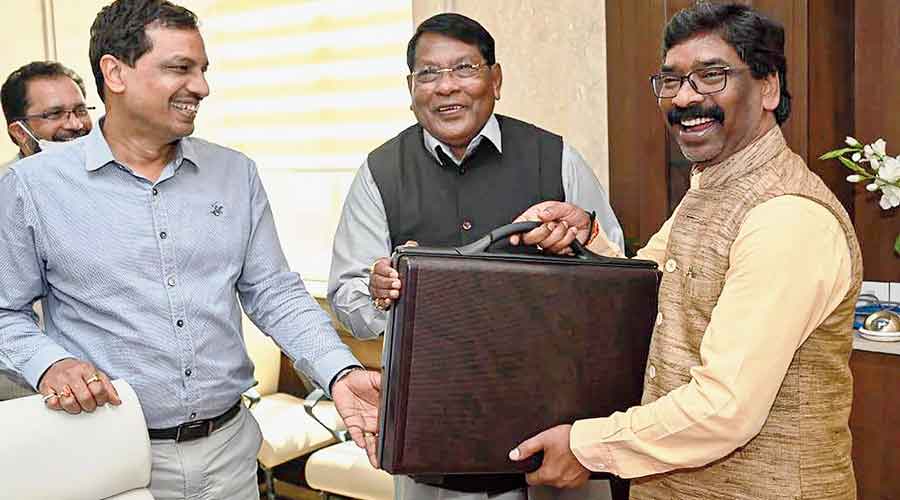Jharkhand finance minister Rameshwar Oraon proposed no new taxes in the state budget for 2022-23 presented in the Assembly on Thursday. He announced certain pro-people schemes.
“Besides being just an income-expenditure statement, a budget also reflects the government’s intention, dedication towards welfare of the society and willpower to execute those,” he said during the presentation of a budget of Rs 1,01,101 crore for 2022-23.
He added that the state government wanted to promote not only ease of doing business but also ease of living for the people of the state.
“We would give Rs 50,000 to each of the beneficiaries of Pradhan Mantri Awas Yojana so that they can construct an additional room to their newly built houses,” Oraon informed media persons after presenting the budget.
The government would also introduce Guruji Credit Card (named after JMM supremo Shibu Soren) for facilitating easy bank loan for students who are willing to pursue higher studies but unable to arrange guarantors, he further informed, adding they would also provide free 100 units of electricity to the poor and woollen garments to all children attending anganwadi centres.
The government would also set up a special fund, initially of 50 crore, for promoting start-ups in the state while increasing the number of Palash retail outlets for promoting sale of products by sakhi mandals or women self-help groups.
The government also planned to introduce Agri Smart Gram Yojana for overall development of 100 chosen villages by conducting gap analysis in those and plugging the gaps by convergence of various schemes.
“It’s difficult to fulfill unlimited expectations with limited resources,” the finance minister said, adding the government took utmost care to address the issues related to water, power, health, education and road construction.
Of the total budget provision for Rs 1,01,101 crore, revenue expenditure would be Rs 76,273.30 crore while capital expenditure Rs 24,827.70 crore, Oraon informed.
Speaking on resource mobilisation, he said Rs 24,850.00 crore would come from receipt of the state’s own taxes, Rs 13,762.84 crore from non-tax revenue, Rs 17,405.74 crore from central assistance, Rs 27,006.58 crore from the state’s share in central taxes, Rs 18,000.00 crore from public debt and Rs 75.84 crore from loans and advances.
The allocation for general sector would be Rs 31,896.64 crore while the same for social and economic sectors would be Rs 37,313.22 crore and Rs 31,891.14 crore respectively, he added.
“Though the growth rate suffered across the country due to Covid induced pandemic during 2020-21, the growth in Jharkhand’s gross state domestic product (GSDP) fell by 4.7 per cent which was less compared to the fall in growth of national GDP of 7.3 per cent,” Oraon informed the state Assembly, adding the growth rate for 2021-22 was expected to be 8.8 per cent at constant price and 14.5 per cent in current price.
During 2022-23, the same were projected at 6.15 per cent at constant price and 10.72 per cent at current price, he further informed, adding the revenue loss for the ensuing fiscal was expected to be Rs 11,286.47 crore that would be 2.81 per cent of the GSDP.
While all others were busy with the budget, a group of legislators, including a few from the ruling parties, sat outside the Assembly for sometime, donning tee-shirts with slogans written in them that demanded introduction of domicile policy and implementation of provisions of the CNT Act.










